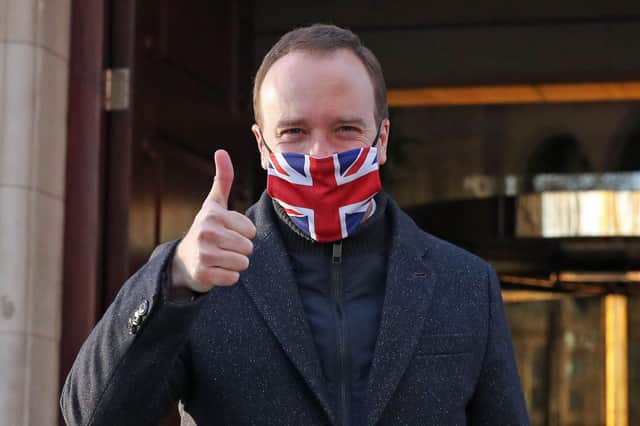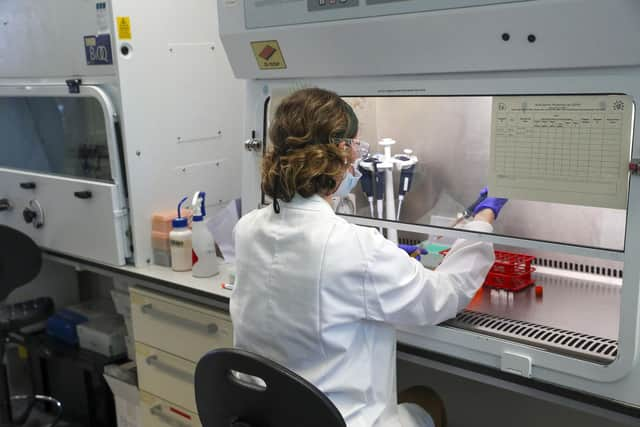Scotland's mass Covid vaccination programme must be run with military precision – Susan Dalgety
This article contains affiliate links. We may earn a small commission on items purchased through this article, but that does not affect our editorial judgement.


It is an unremarkable grey sofa in an unremarkable room where our grandchildren used to gather for sleepovers, and where I now spend almost all my waking hours.
If I crane my neck, I can just about glimpse the sea from the narrow tenement window, but I cannot miss the large television that dominates the space. For months now I have watched the world through Sky News, CNN, YouTube and, occasionally, the BBC.
Advertisement
Hide AdAdvertisement
Hide AdBoris Johnson’s faltering press conferences where he stumbled from herd immunity to total lockdown in a matter of days.
Nicola Sturgeon’s pursed lips as she insisted almost daily that even though the medicine was hard to swallow, it was good for us. “It won’t hurt you, honestly,” she said, forcing it down, even as we cried.
Donald Trump’s deranged episodes. “Drink bleach,” he basically exhorted. “Sleepy Joe will lose,” he insisted. “It was a fix,” he screamed as he realised his time was up.
First tulips of the year


The grey sofa was where I watched, broken-hearted, as we finally left the EU. “We have a deal,” grinned Johnson, his brassy blond hair an even worse home dye job than mine.
I have spent all my adult life as a European citizen, free to wander round mainland Europe at will, as I did in 2017. Now my maroon passport lies unused in a drawer, gathering dust as I flick from channel to channel in search of adventure, instead of boarding a plane to Africa or singing along to Springsteen’s Thunder Road as our vintage motorhome growls her way round France. My life has shrunk until it is nothing more than a large dent on a grey sofa.
But wait. The first tulips of the year are in the supermarket, their closed petals unfurling in the heat of my flat to reveal a hint of spring. Pungent blue flowers have emerged from the hyacinth bulbs that looked dead only a few days ago.
The sun sets later each evening, giving us an extra few minutes of winter light. By January 18, we will have gained an extra hour each day and two days later, Joseph Robinette Biden Jr will be sworn in as the 46th President of the United States. America’s authoritarian nightmare and, by extension ours, is coming to an end.
And the Oxford-AstraZeneca coronavirus vaccine has been approved for use in the UK. Let me repeat that… the Oxford-AstraZeneca coronavirus vaccine has been approved for use in the UK.
Advertisement
Hide AdAdvertisement
Hide AdThanks to the (unusual) foresight of the UK government we now have enough doses of this vaccine to protect 50 million people. The trick is getting it into people’s arms.
Put a grown-up in charge
As Joe Biden pointed out earlier this week, it will “take more time than anyone would like’’ to vaccinate the majority of Americans, and he warned that this is “the greatest operational challenge we've ever faced as nation”.
As it is here. We are at war, and the vaccine is our main weapon. This cannot be a leisurely winter flu jab programme – the Covid-19 vaccination drive must be run with military precision. Every adult capable of plunging a needle into someone’s arm should be recruited.
Clinics should be open in the evenings as well as weekends. Mobile units should go to rural areas to ensure no-one is left unprotected. And there should be a general in charge. Not a chap in a uniform, and definitely not a politician, but a trusted, experienced grown-up with no axe to grind, no message to spin, who can make sure the vaccine programme runs like clockwork.
There are only 5.5 million people in Scotland. In 1947, New York vaccinated six million people against smallpox in four weeks. Israel – with a population of nearly nine million – has already protected half a million people in nine days and shows no sign of easing up.
Supermarkets fill their shelves with produce from across the world without breaking a sweat. I can send money to Malawi within 15 minutes, simply by tapping my phone. Surely – supply chain willing – it is not beyond our national ingenuity to vaccinate the majority of Scots before the clocks change on March 28.
Lives on hold, our economy broken
But already I am beginning to worry. Adverts for receptionists and call handlers to support Lothian’s vaccination programme have only just been placed. Social media hints of GPs reluctant to do their duty unless they are paid more than the £12.50 per jab they have already been offered.
In the absence of a published national roll-out plan, Glasgow MSP Pauline McNeill has tabled six questions about the process, from weekly targets to how many doses will be available each month. She – we – will have to wait until at least January 12 for the answers, but the plan should be the first thing we see when we click on www.gov.scot now, not in a few weeks’ time.
Advertisement
Hide AdAdvertisement
Hide AdBecause until enough people are vaccinated against this damn virus, every one of us is confined to the sofa, our lives on hold, our economy broken.
Our political masters demanded a lot from us in 2020 – and by and large, we did as we were told. We are still complying, sullenly, with the biggest peace-time restrictions any of us have ever experienced.
In return we need an assurance that our public servants are capable of meeting the biggest challenge they will ever face. Above all else, we need hope that 2021 is going to be better than the year that has just passed.
A message from the Editor:
Thank you for reading this article. We're more reliant on your support than ever as the shift in consumer habits brought about by coronavirus impacts our advertisers.
If you haven't already, please consider supporting our trusted, fact-checked journalism by taking out a digital subscription.
Comments
Want to join the conversation? Please or to comment on this article.
